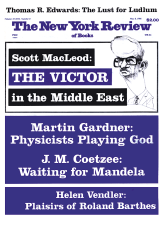We do not often find a vocational-guidance manual as useful or a domestic-relations chronicle as lively as Nicholas Pileggi’s Wiseguy: Life in a Mafia Family. Wiseguy ends with Henry Hill, Pileggi’s antsy antihero, lodged with 4,500 other civil servants in the $25-million-budget line of a federal protected-witness program that scrupulously observes merit-system standards. Hill and his fellow bureaucrats have passed the entry-level test for experience at criminal pursuits and have established their tenure by turning in such of their former comrades as missed the lesson that organized crime, like the old American Communist party, is an enterprise whose securest profits are reserved not for those who stay but for those who bolt.
We are fortunate that this public servant who earned office with twenty-five years of diligent application to the works of the public enemy has found a biographer with gifts for irony and intimacy as singular as Pileggi’s. Wiseguy would be distinctly less compelling if its author did not have an eye inclined to focus upon his protagonist’s nature and ambiance more zestfully than upon his actions. Hill’s reminiscences persuade us indeed that larcenous pursuits have settled into routines so simple and so safe from any more-than-occasional intrusion by law officers that the hours when the felon is not engaged at his vocation are altogether more interesting than those when he is.
These daily rounds, by their very hyperactivity, begin to numb us with their tedium, and, stuck as he was in an occupation skimpy with chances for character growth and change, Hill ends up engaging us far less than does his wife, the former Karen Freid, a Long Island dental assistant, who thought she was marrying a bricklayer with unusual cachet at the Copacabana, discovered the reality—as much a fantasy, of course, as her original misapprehension—and so adjusted herself to her homemaker’s responsibilities that in due course she was visiting her husband in prison with her brassiere stuffed with marijuana and pills for sale to his inmate brothers. She is currently displaying the same marvelous adaptability as a real-estate peddler in her family’s new place of refuge.
The family of Henry Hill’s uneasy household commands our interest far more lastingly than the Mafia family of his allegiance; and it is Pileggi’s appreciation of the difference and the illuminations of his domestic touches that set his apart from the run of those institutional Mafia studies which seem to grow more bloodless with each fresh effusion of the bloody.
Six years after he had the wit to repair to the recruiting offices of the forces of light, Henry Hill lives, by Pileggi’s account, “somewhere in America…[with] a successful business, a $150,000 house,” and children in private schools. He has a Keogh plan, and he can put some glow in the gray days of legitimacy with the trips on which he earns his $1,500-a-month government salary by swearing old fellow felons into jail, in the most conspicuous cases for some kindness they had once done him. Hill, Pileggi wonderfully concludes, “has turned out to be the ultimate wiseguy.”
Yet somehow it is hard to see him assured of his happy ending or of a redemption that, however calculated, is of the stuff that wears. For Pileggi’s most telling effects are in his portrait of a species for which larceny is not a job but a whole soul’s impulse.
Paul Vario, the soi-disant Lucchese family capo who was Hill’s great patron, is the very incarnation of this passion for theft for theft’s own sake. Hill takes it for granted that Vario is many times a millionaire. But he would never invite Mrs. Vario out on the town without picking up a stolen credit card to refresh the evening. “He always said that liquor tastes better” on a stolen card. “The real thrill of the night for Paulie, his biggest pleasure, was that he was robbing someone and getting away with it.”
The professional criminal finds his authentic spiritual nourishment not in getting something but in getting away with something. When Nicky Barnes went to prison for having sold a small mountain of heroin, he fought for his sense of identity with a protracted attempt to move half a kilo. It had been almost easy to overcome the habit of using; what Barnes could not conquer was the habit of selling.
When the FBI set forth on the hunt for William Masselli, the Bronx butcher, it employed Michael Orlando, a backslid tough guy, as its lead dog. Within weeks, Orlando was caught hijacking trucks for delivery to Masselli’s meat market, and, after sustaining its tolerance as long as it could, and rather longer than it ought, the FBI turned him loose. He has since descended on the public employment ladder from the federal to the municipal rung, where he sits as a protected witness of Bronx District Attorney Mario Merola, a paymaster necessarily less lavish than the Attorney General of the United States. Given Orlando’s history, Merola can hardly look at him without crossing his fingers; and, given Hill’s, the rest of us would do well to be just as dubious in our glance upon him.
Advertisement
Hill has won through to a secure existence at the price of surrender to an ordinary one. The rewards of stability arrive inextricably accompanied by the penalties of legality. There has to come a time when he understands that, get away with life in the long term though he has, he has been cheated of the delights of getting away with something in the short. From simple boredom, he will, if his past is any guide, likely lurch into directions of the illicit and, in the process, wreck the business. Penitence, while otherwise serviceable, is just not enough fun.
This Issue
May 8, 1986



